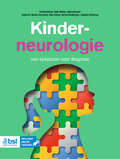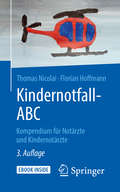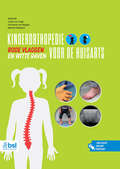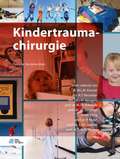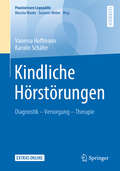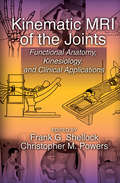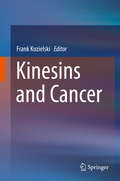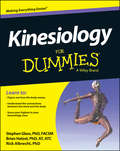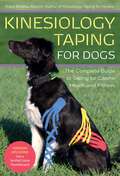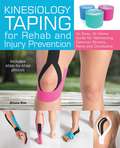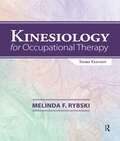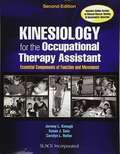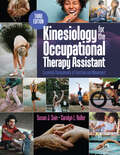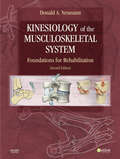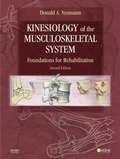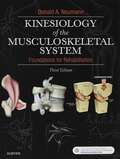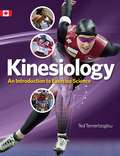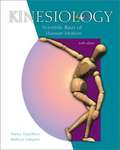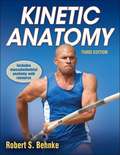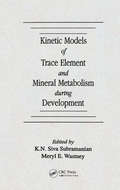- Table View
- List View
Kinderfysiotherapie
by R. Van Empelen Ria Nijhuis-Van Der Sanden Annelies HartmanIn deze druk wordt een beeld gegeven van vernieuwingen in visie, werkwijze en inzichten in de Nederlandse kinderfysiotherapie. Zowel wetenschappers als praktisch georiënteerde kinderfysiotherapeuten en andere bij kinderen betrokken behandelaars belichten hun invalshoeken op de diverse indicatiegebieden. In het boek wordt achtereenvolgens beschreven hoe het methodisch systematisch handelen, het gebruik van de International Classification of Functioning, Disability and Health for Children and Youth (ICF-CY) als classificatiesysteem en het Hypothesis-Oriented Algorithm for Clinicians II (HOAC-II) als model voor klinisch redeneren verhelderend werken en de transparantie vergroten. Hierdoor is het boek niet alleen geschikt als studieboek voor de opleiding, maar is het zeker ook onmisbaar voor reeds praktiserende kinderfysiotherapeuten. Daarnaast is het boek waardevol voor kindergeneeskundigen, kinderartsen, (kinder)revalidatieartsen, huisartsen, consultatiebureauartsen, ergotherapeuten, orthopedagogen, logopedisten, psychologen en vele andere professionele hulpverleners in de kinder- en jeugdgezondheidszorg. De redactie was ook deze keer in handen van Ron van Empelen, Ria Nijhuis-van der Sanden en Annelies Hartman.
Kinderneurologie: van symptoom naar diagnose
by Dewi Bakker Oebo Brouwer Nynke Doornebal Elisa Hamer Karina Kersbergen Jolanda SchievingDit is geen standaard leerboek over de kinderneurologie. Zoals de titel reeds suggereert, zijn in dit boek niet ziektebeelden leidend, maar klachten en symptomen. Daarbij ligt de nadruk op aanwijzingen in de anamnese en neurologisch onderzoek die leiden naar een differentiële diagnose en aanvullend onderzoek. Na enkele algemene hoofdstukken over anamnese, onderzoek, aanvullend onderzoek en revalidatiegeneeskunde volgt de bespreking van een groot aantal klinische problemen waarmee kinderen zich kunnen presenteren op de polikliniek en de spoedeisende hulp. Er is daarbij niet gestreefd naar volledigheid, maar gekozen voor thema’s die voor de alledaags klinische praktijk het meest relevant zijn. De hoofdstukken zijn geschreven door een groot aantal jonge en meer ervaren kinderneurologen uit heel Nederland, waarbij rekening is gehouden met hun specifieke expertise op een bepaald gebied. Online is ook het ebook beschikbaar met extra informatie; er zijn verwijzingen naar overzichtsartikelen en adressen van nuttige websites opgenomen. Bij elk hoofdstuk hoort een module met oefenvragen waarmee de eigen kennis getest en uitgebreid kan worden. De belangrijkste doelgroep vormen artsen in opleiding tot neuroloog of kinderarts en kinderneurologen in opleiding, maar het boek is ook geschikt voor medici en paramedici die regelmatig contact hebben met kinderen met neurologische aandoeningen, zoals neurologen, kinderartsen, revalidatieartsen, psychologen en fysiotherapeuten.
Kindernotfall-ABC: Kompendium Für Notärzte Und Kindernotärzte
by Thomas Nicolai Florian HoffmannIn diesem kleinen handlichen Buch für die Kitteltasche beschreiben erfahrene Kindernotärzte der Münchner Universitätsklinik die wichtigsten Fakten für die optimale, präklinische Notfallversorgung von Kindern. Es wendet sich an alle Notärzte, aber auch Pädiater, die sich für die Primärversorgung schwerstkranker und verunfallter Kinder wappnen möchten.Viele wertvolle Tipps zum konkreten Vorgehen sowie die Angabe der Dosierungen der Notfallmedikamente – gewichtsadaptiert und als fertig ausgerechnete Absolutmenge – machen das Werk besonders praxistauglich. Die 3. Auflage erscheint komplett aktualisiert und um ein Kapitel mit den häufigsten ICD-10-Diagnosen erweitert.Aus dem Inhalt· Zugangswege, Analgosedierung, Narkose· Atemwegsmanagement, Intubation, Beatmung· Respiratorische, neurologische, kardiale, traumatologische Notfälle· Schock, Verbrennung, Vergiftung, Anaphylaxie· Reanimation von Kleinkindern und Neugeborenen
Kinderorthopedie voor de huisarts: Rode vlaggen en witte raven
by Joost Van Linge Christiaan Van Bergen Melinda WitbreukHuisartsen krijgen geregeld vragen op het spreekuur over klachten van het bewegingsapparaat bij kinderen. Zoals vragen over de stand van de benen en voeten of de manier van lopen. De fysiologische range is breed. Maar wanneer is er toch iets meer aan de hand met een x-been? En kun je met volle overtuiging ouders geruststellen dat het wel goed komt met die platvoeten? Dit boek is praktisch en visueel ingesteld om de huisarts tijdens een consult snel wegwijs te maken in de kinderorthopedie. Hierbij wordt zowel de scheiding tussen fysiologie en pathologie als de meest voorkomende kinderorthopedische problemen besproken. Rode vlaggen die niet gemist mogen worden en witte raven die zich in de eerste lijn kunnen presenteren zijn in de tekst goed herkenbaar weergegeven. De hoofdstukken starten met een overzichtstabel met incidenties, typische leeftijd van presentatie en mogelijke symptomen. Zo blijven in één oogopslag nog maar een paar diagnoses in de differentiaaldiagnose (DD) staan. Met veel beeldmateriaal en illustraties en praktische informatie geeft dit boek de handvatten om tot de juiste diagnose te komen en de patiënt uitleg te geven. Ook geeft de redactie advies of aanvullend onderzoek zinvol is, welke behandeling in de eerste lijn gestart kan worden en wanneer verwijzing naar de tweede lijn nodig is. Kinderorthopedie voor de huisarts, rode vlaggen en witte raven is in eerste instantie interessant voor de huisarts. Maar ook alle (para)medici die in aanraking komen met de kinder ortho pedische pathologie zullen in dit boek terug kunnen vinden waar ze in hun spreekkamer mee in aanraking komen. De redactie bestaat uit Joost van Linge, orthopedisch chirurg voor kinderen in het Juliana Kinderziekenhuis en Reinier de Graaf Gasthuis. Christiaan van Bergen, orthopedisch chirurg in het Amphia Breda en Erasmus MC – Sophia Kinderziekenhuis Rotterdam. Melinda Witbreuk, orthopedisch chirurg in het OLVG en het Amsterdam UMC in Amsterdam.
Kindertraumachirurgie
by W.L.M. Kramer A. T. Besselaar J.H.J.M. Bessems M.J.R. Edwards J. C. Goslings M. Heeg P. Kloen L.P.H. Leenen R.M.H. WijnenHet hoort bij de ontwikkeling van kinderen van iedere leeftijd. In hun spel en dynamiek proberen ze altijd hun grenzen uit. Een ongeluk zit dan in een klein hoekje. Kleine of juist zeer ernstige letsels kunnen op ieder moment optreden, op elke leeftijd, van klein tot groot. Juist dat maakt kinderen uniek: zó zijn ze doodziek en zó zijn ze weer springlevend. Zó huilen ze en zó lachen ze.Deze kenmerken bepalen bij kinderen sterk de presentatie van de klachten en de verschijnselen na letsel . Daarom vergt het behandelen van kinderen specifieke kennis en ervaring. Het is voor de behandelaar essentieel deze dynamiek te onderkennen en het kind weer vrolijk en speels aan het lachen te krijgen.Kinderen zijn fantastisch, ze verdienen optimale traumazorg en preventie. In het boek Kindertraumachirurgie vindt de behandelaar specifiek de noodzakelijke kennis. Onze missie is: ‘Laat kinderen met letsels zo optimaal mogelijk behandeld worden, door kennis en kunnen over de kindertraumatologie door Nederlandse specialisten naar internationale maatstaven weer te geven’.In zestig hoofdstukken wordt door meer dan honderd specialisten een gedetailleerd en actueel overzicht gegeven over de preventie, diagnostiek en behandeling van ongevalsletsels bij kinderen.Dit boek is bestemd voor iedereen die met kinderongevallen te maken heeft: chirurgen, orthopedisch chirurgen, traumatologen, kinderartsen, intensivisten, (kinder)neurologen, revalidatieartsen, (kinder)fysiotherapeuten, SEH-artsen, huisartsen, verpleegkundigen en andere (kinder)specialisten.
Kinderwunsch - Wie Physiotherapie helfen kann
by Anne Marie JensenOb zur Vorbereitung einer Fertilitätsbehandlung, in Ergänzung zu einer begonnenen Therapie oder als Alternative zu schulmedizinischen Behandlungen – dieser Ratgeber informiert Frauen und Paare mit unerfülltem Kinderwunsch darüber, wie physiotherapeutische Maßnahmen auf dem Weg zum Wunschkind helfen können. Die vorgestellten Methoden und Eigenübungen eröffnen in jeder Phase der Kinderwunsch-Behandlung schonende und kostengünstige ergänzende Möglichkeiten, um die Chancen auf eine Schwangerschaft zu erhöhen. Die Autorin nimmt Sie mit auf eine Reise über mehrere Kontinente und zeigt, wie Physiotherapie in Europa, Japan und den USA seit den 1970er Jahren als unterstützende Methode bei Fertilitätseinschränkungen angewendet wurde und wird. Nutzen Sie die vielfältigen Möglichkeiten, die die Physiotherapie Ihnen bietet!
Kindesmisshandlung: Medizinische Diagnostik, Intervention und rechtliche Grundlagen
by Bernd Herrmann Reinhard B. Dettmeyer Sibylle Banaschak Ute ThyenDas bewährte Fachbuch zum Kinderschutz in der Medizin bietet Strategien für den Umgang mit Verdachtsfällen von Kindesmisshandlung und -vernachlässigung, fundierte fachliche Grundlagen für die Diagnose, Sicherheit in Rechtsfragen und erprobte Konzepte für die Intervention. Fundierte somatische Diagnostik Leitliniengerecht, hohe EvidenzRationale diagnostische StrategienForensische BefundsicherungKinder- und jugendgynäkologische Grundlagen Umsichtige Intervention & Prävention Gesprächsführung mit Eltern, Kindern und JugendlichenInterdisziplinäre Netzwerke schaffen und nutzenFrühe Hilfen und KinderschutzSchutzkonzepte für den Umgang mit Missbrauch in Institutionen Gesellschaftliche und rechtliche Grundlagen Auszüge wichtigster GesetzeGesetzlicher Opferschutz, psychosoziale Folgen Kompakt und praxisrelevant Korrekte Anamnese und DokumentationMerkblätter, Checklisten, InternetadressenPraxistipps, Differenzialdiagnosen und Fallstricke Vom „unguten Gefühl“ zu evidenzbasiertem Handeln. Unter Berücksichtigung der aktuellen Literatur, Gesetze und Rechtsprechung sowie der neuen nationalen AWMF S3+ Kinderschutzleitlinie und internationaler Leitlinien. Das erste deutschsprachige Handbuch für fachgerechte medizinische Diagnostik und Intervention. Das notwendige „Handwerkszeug“ für Ärzte und andere Gesundheitsberufe, um in der täglichen Praxis die richtigen Entscheidungen zu treffen. Als bewährter Leitfaden, Ratgeber und Nachschlagewerk für Ärzte, aber auch alle anderen beteiligten Fachleute im Kinderschutz: Juristen, Polizei, Jugendämter, Beratungsstellen. Mit allen relevanten Inhalten für Basis- und Aufbaukurs des Zertifikatslehrganges Kinderschutzmedizin der Deutschen Gesellschaft für Kinderschutz in der Medizin (DGKiM).Mit eLernkarten „Flashcards“ zur Vorbereitung auf die Zertifikatsprüfung Kinderschutzmedizin der DGKiM.
Kindliche Handfehlbildungen in Ergotherapie und Physiotherapie: Manuelle Behandlung und Schienentherapie
by Maren Schelly Anna-Lena DunseDieses Praxisbuch liefert die wesentlichen Grundlagen zur Behandlung kindlicher Handfehlbildungen in Ergotherapie und Physiotherapie. Wie wird die Funktion der fehlgebildeten Hand beurteilt? Wann beginnt die intensive manuelle Behandlung und Schienentherapie bei angeborenen Beugekontrakturen? Ab wann muss nach einer Pollizisation mit Manueller Therapie begonnen werden? Die Expertinnen liefern Ihnen die Antworten! Aus dem Inhalt: · Anatomische und Motorische Entwicklung der Hand · Handfehlbildungen, u.a. radialer longitudinaler Reduktionsdefekt, Kamptodaktylie und Arthrogrypose · Narbenbehandlung · Hilfsmittelversorgung Plus: Extra Kapitel zu Tipps, Tricks und weiterführenden Informationen Verhelfen Sie Ihren kleinen und kleinsten Patient*innen zu mehr Selbstständigkeit und Lebensqualität!
Kindliche Hörstörungen: Diagnostik - Versorgung - Therapie (Praxiswissen Logopädie)
by Karolin Schäfer Vanessa HoffmannUrsachen von peripheren Hörstörungen und deren Auswirkungen bei Kindern sind vielfältig. Dieses Praxisbuch zeigt Logopädinnen und Sprachtherapeutinnen den aktuellen Stand der audiologischen und sprachtherapeutischen Diagnostik, die Versorgungsmöglichkeiten mit Hörgeräten und implantierbaren Hörsystemen und gibt evidenzbasierte Empfehlungen für die sprachtherapeutische Behandlung.Inhaltliche Schwerpunkte sind z.B. Grundlagen und Diagnostik, Sprachtherapieplanung und Therapiebausteine, weiterführende pädagogische Handlungsfelder wie Frühförderung, Mehrfachbehinderung, Mehrsprachigkeit, Sprachförderung mit lautsprachunterstützenden Gebärden in Abgrenzung zu Gebärdensprache und das ganzheitliche und interdisziplinäres Vorgehen. Ein weiterer Band aus der bewährten Reihe "Praxiswissen Logopädie".
Kindliche Kompetenzen: Was Eltern in den ersten Lebensjahren an ihrem Kind beobachten können
by Arnold LohausIn diesem Sachbuch erfahren Sie als Eltern, welche psychosozialen Kompetenzen sich im Vorschulalter entwickeln und wie Sie die Entwicklung konkret beobachten können. Die Darstellung umfasst drei Altersbereiche: (1) Erstes Lebensjahr, (2) zweites und drittes Lebensjahr sowie (3) viertes und fünftes Lebensjahr. Für jedes Lebensalter erfahren Sie von wichtigen Entwicklungsthemen (Sprachverständnis, Bindung, Schlaf-Wach-Rhythmus, Selbstkonzept etc.). Zu jedem Entwicklungsthema finden Sie kurze Hintergrundinformationen. Danach lesen Sie, was Sie bei Ihrem Kind konkret beobachten können und was das für Sie bedeuten könnte. Das Ziel ist es, die Aufmerksamkeit auf die vielfältigen Kompetenzen zu lenken, die Kinder schon in den ersten Lebensjahren an den Tag legen, und das Auge dafür zu schulen, die vielfältigen Entwicklungsveränderungen von Kindern bewusst wahrzunehmen und auch Ideen dafür zu bekommen, Kinder gezielt in ihrer Entwicklung zu fördern. Aus dem Inhalt: 50 Entwicklungsthemen in den ersten fünf Lebensjahren mit einer Schwerpunktsetzung auf die psychosoziale Entwicklung: sprachliche, kognitive, emotionale und soziale Entwicklung. Der Autor: Arnold Lohaus ist Professor für Entwicklungspsychologie und Entwicklungspsychopathologie an der Universität Bielefeld und Autor zahlreicher Buch- und Zeitschriftenpublikationen.
Kinematic MRI of the Joints: Functional Anatomy, Kinesiology, and Clinical Applications
by Frank G. Shellock Christopher M. PowersKinematic MRI refers to imaging a joint through a range of motion to examine the interactions between the soft tissue and osseous anatomy that comprise the joint. Kinematic MRI techniques were developed because various pathologic conditions are dependent on the specific position of the joint or in response to loading or stress. Importantly, static-
Kinesins and Cancer
by Frank KozielskiThis interdisciplinary volume collates research work on kinesins and cancer. Authors attempt to validate members of the kinesin superfamily as potential targets for drug development in cancer chemotherapy. The work begins by highlighting the importance of kinesins, summarising current knowledge and how they are shown to be crucial for mitosis. Chapters go on to explore how this family of proteins are emerging as a novel target for chemotherapeutic intervention and drug development. Readers will learn how kinesins travel along microtubules to fulfill their many roles in intracellular transport or cell division. Several compounds that inhibit two mitotic kinesins (called Eg5 and CENP-E) have entered Phase I and II clinical trials and are explored in these chapters. Additional mitotic kinesins are currently being validated as drug targets, raising the possibility that the repertoire of kinesin-based drug targets may expand in the future. The book is suitable as a reference standard for the field of kinesins and cancer. It will interest those in academia and pharmaceutical companies, and anyone with an interest in the medical relevance of these proteins, which cutting edge methodologies are now enabling us to understand in astonishing detail.
Kinesiology For Dummies
by Steve Glass Brian Hatzel Rick AlbrechtMove at your own pace with this kinesiology course guideA required course for majors pursuing sports medicine, exercise science, nursing, or sports therapy degrees, kinesiology is central to a variety of fields. Kinesiology For Dummies tracks an introductory course in the science and imparts the basics of human body movement. With this resource, you will learn how physical activity can alleviate chronic illnesses and disabilities, what factors contribute to musculoskeletal injury, and how to reverse those influences. Complete with a 16-page color insert of medical instructions, this book covers the basics of exercise physiology, exercise and health psychology, introductory biomechanics, motor control, history and philosophy of sport and exercise, and mind-body connections.Written by experts in exercise scienceAddresses a timely subject as exercise science careers and majors are increasingly popularRuns parallel to a kinesiology course with accessible, concise languageInterested learners, kinesiology students, and health or sports therapy professionals will benefit from this refresher course in the basics.
Kinesiology Taping for Dogs
by Katja Bredlau-MorichDo-it-yourself physical therapy techniques for keeping your dog happy, active, and pain-free-now and for years to come.Kinesiology taping on humans is now commonplace—it is widely used by physical therapists, chiropractors, and personal trainers. The idea behind taping is that it provides incredible support and stabilization of ligaments and tendons while simultaneously stretching and flexing like a &“second skin&” to allow full range of motion. It can also activate or relax muscles, depending on its application.Taping is now also being successfully applied to other animals. Canine and equine physiotherapist Katja Bredlau-Morich, author ofKinesiology Taping for Horses,is a pioneer in bringing the method to the dog world. She believes that dogs can benefit hugely from taping techniques, and even better, dog owners and trainers can learn practical steps to using kinesiology tape themselves. In her terrific guidebook, Bredlau-Morich provides the ultimate reference for understanding both the uses of kinesiology tape and its numerous canine applications. With hundreds of color photographs and step-by-step instructions for the do-it-yourselfer, her book explains the following forms of kinesiology taping:MuscleScarFasciaIn addition, numerous case studies demonstrate how taping can change a dog's life, keeping him a happy, active, pain-free companion for years to come.
Kinesiology Taping for Rehab and Injury Prevention: An Easy, At-Home Guide for Overcoming Common Strains, Pains and Conditions
by Aliana KimTHE ULTIMATE DIY TAPING GUIDE OF EVERYDAY INJURIES AND AILMENTS INCLUDES OVER 200 STEP-BY-STEP PHOTOSWidely used by physical therapists, chiropractors and personal trainers, kinesiology tape provides incredible support while simultaneously stretching so your body can perform its normal range of motion. Now you can utilize this amazing material at home. Simply buy a roll at your local drugstore and follow the taping methods described in this book to reduce pain, rehab an injury and get back in the game.Providing clear step-by-step instructions and helpful photos, the author shows how to tape the most common injuries and conditions anywhere on the body:• Neck pain• Frozen shoulder• Bicep strain• Tennis elbow• Wrist sprain• Tight IT band• ACL/MCL sprains• Achilles tendinitis• Ankle sprain• Plantar fasciitis
Kinesiology for Occupational Therapy
by Melinda RybskiKinesiology for Occupational Therapy, Third Edition covers the theoretical background for understanding the kinematics and kinetics of normal human physiological movement. Each specific joint is assessed in terms of musculoskeletal function, movements possible, and an overview of pathology that may develop. Dr. Melinda Rybski covers four occupational therapy theories related to functional motion that are important for occupational therapists to know. This Third Edition has been updated to reflect the current field and includes new information that has emerged in recent years. New in the Third Edition: Content closely follows AOTA’s Occupational Therapy Practice Framework and Occupational Therapy Vision 2025 Updated and more extensive provision of evidence that summarizes key findings in current literature New theories are presented in the Intervention sections Extensive, joint specific and theory-based assessments are provided Interventions described are occupation-based, process-based Kinesiology concepts presented in a practical, useable way Expanded chapters for Spine and Thorax and Hip and Pelvis. Included with the text are online supplemental materials for faculty use in the classroom.Kinesiology for Occupational Therapy, Third Edition clearly outlines the need for an understanding of kinesiology in occupational therapy, providing occupational therapists with the evidence necessary to support their intervention strategies.
Kinesiology for The Occupational Therapy Assistant: Essential Components of Function and Movement
by Jeremy L. Keough Susan J. Sain Carolyn L. RollerKinesiology for the Occupational Therapy Assistant: Essential Components of Function and Movement, Second Edition approaches the study of kinesiology by connecting function to the underlying components that make movement possible. Jeremy Keough, Susan Sain, and Carolyn Roller present a text that makes learning and retaining information easier for students through the application. A top-down approach, based on the AOTA's Occupational Therapy Practice Framework, Third Edition is used to allow the student to see the big picture and then guide them to understand what fundamental kinesiological functions may be causing limitations or decreased engagement in daily activities. Benefits and Features: - New chapters on kinesiology and therapeutic exercise, as well as functional mobility in the home and community - Upper extremity information is divided into four chapters for enhanced learning; information presented addresses function across the lifespan- Occupational profiles describing actual client conditions at the beginning of several chapters - Occupation/real-life based activities and questions at the end of each chapter - Emphasis on function and identification of how and why movement occurs - Multiple tables and figures to enhance learning - Call out boxes that highlight and clarify key concepts - A seamless integration of theory, fact, and practice - Selected standardized tests, pinch and grip strength, and range of motion norms - Glossary of terms and expanded Web resources - Instructors materials include PowerPoint presentations, student study guides, and a test bank Kinesiology for the Occupational Therapy Assistant: Essential Components of Function and Movement, Second Edition provides students with thorough explanations and learning activities that will put kinesiology into context. Students will also gain insight into the practice of occupational therapy through directed questions and problem-solving to assist the client in achieving movement goals.
Kinesiology for the Occupational Therapy Assistant: Essential Components of Function and Movement
by Susan Sain Carolyn RollerThe only kinesiology book written by occupational therapy practitioners for the occupational therapy assistant is back with the Third Edition.Kinesiology for the Occupational Therapy Assistant: Essential Components of Function and Movement, Third Edition approaches the study of kinesiology by connecting function to the underlying components that make movement possible.This text uses a top-down approach to showcase the functional level of a client and then guides the reader to ascertain what fundamental kinesiological functions may be causing limitations or decreased engagement in daily activities. Occupational profiles introduce occupational therapy assistant students to real-life patients and describe occupational therapy treatment and patient outcomes. The reader will gain insight into the practice of occupational therapy through solving problems and developing questions needed to assist the client to achieve movement-related goals in tasks, activities, and occupations.What’s included in the Third Edition:• Updates to reflect AOTA’s model curricula for basic sciences and the OTPF-4. • Chapters on kinesiology and therapeutic exercise as well as functional mobility in the home and community.• Emphasis on function and identification of how and why movement occurs.• Select standardized tests, pinch and grip strength, and range of motion norms are noted where appropriate.Included with the text are online supplemental materials for faculty use in the classroom.Kinesiology for the Occupational Therapy Assistant: Essential Components of Function and Movement, Third Edition is a one-of-a-kind text that will enable occupational therapy assistant students to identify the underlying components that make movement possible.
Kinesiology of the Musculoskeletal System
by Donald A. Neumann Pt FaptaWith its focus on the normal and abnormal mechanical interactions between the muscles and joints of the body, Kinesiology of the Musculoskeletal System: Foundations for Rehabilitation, 3rd Edition provides a foundation for the practice of physical rehabilitation. This comprehensive, research-based core text presents kinesiology as it relates to physical rehabilitation in a clinically relevant and accessible manner. It provides students and clinicians with the language of human movement - and acts as a bridge between basic science and clinical management. Full-color anatomic and kinesiologic illustrations clearly demonstrate the anatomy, functional movement, and biomechanical principles underlying movement; and dynamic new video clips help you interpret new concepts with visual demonstration. More than 900 high-quality illustrations provide you with the visual accompaniments you need to comprehend the material. Clinical Connections boxes at the end of each chapter in Sections II through IV highlight or expand upon a particular clinical concept associated with the kinesiology covered in the chapter. Special Focus boxes interspersed throughout the text provide numerous clinical examples that demonstrate why kinesiologic information is needed. Critical thinking questions challenge you to review or reinforce the main concepts contained within each chapter. Evidence-based approach emphasizes the importance of research in physical therapy decision-making. Evolve site for students comes with video clips, answers to study questions, and references linked to Medline. Evolve site for instructors includes an image collection from the text, teaching tips, and lab activities. NEW! Kinesiology of Running chapter covers the biomechanics of running. NEW! Video clips and animations help you interpret new concepts with visual demonstration. NEW! All-new content on the pelvic floor. NEW! Thoroughly updated references emphasize the evidence-based presentation of information in the text. NEW! QR codes linked to videos for easy viewing on mobile devices. NEW! Pageburst enhanced edition allows you to access multimedia content from the eBook without going to another website.
Kinesiology of the Musculoskeletal System - Elsevier on VitalSource: Foundations for Rehabilitation
by Donald A. NeumannUNIQUE! Clinical Connections boxes in each chapter enhance your understanding and promote practical application. Special Focus boxes and clinical examples throughout the text bridge classroom content with real-world application to help you succeed in practice. Logically organized content establishes an understanding of fundamental concepts before moving on to more complex material to make learning easier. Chapter outlines provide a framework for learning and enable you to reference specific topics at a glance. UNIQUE! A companion Evolve Resources website reinforces your understanding through kinesiology video clips and answers to study questions. UNIQUE! More than 500 high-quality, full-color illustrations clarify musculoskeletal anatomy and reinforce anatomic concepts. Study questions in each chapter test your comprehension and strengthen your critical-thinking capabilities.
Kinesiology of the Musculoskeletal System: Foundations For Rehabilitation
by Donald A. NeumannWith its focus on the normal and abnormal mechanical interactions between the muscles and joints of the body, Kinesiology of the Musculoskeletal System: Foundations for Rehabilitation, 3rd Edition provides a foundation for the practice of physical rehabilitation. This comprehensive, research-based core text presents kinesiology as it relates to physical rehabilitation in a clinically relevant and accessible manner. It provides students and clinicians with the language of human movement ― and acts as a bridge between basic science and clinical management. Full-color anatomic and kinesiologic illustrations clearly demonstrate the anatomy, functional movement, and biomechanical principles underlying movement; and dynamic new video clips help you interpret new concepts with visual demonstration.
Kinesiology: An Introduction to Exercise Science
by Ted TemertzoglouThe new Kinesiology goes beyond the curriculum, for a well-rounded understanding of the relevant concepts and issues. 45 special interest features will excite your students and stretch their imaginations. Features include: <p><p> Lifestyle Diseases <p> Gray’s Anatomy, 1858 <p> What Makes Usain Bolt Run <p> Long-Term Athlete Development <p> Yoga and Pilates
Kinesiology: Scientific Basis of Human Motion
by Nancy Hamilton Kathryn Luttgeosthe science of movement
Kinetic Anatomy (Third Edition)
by Robert BehnkeCreated primarily for those who will work in physical activity fields, the third edition of Kinetic Anatomy continues to building on its previous editions to assert itself as the ideal resource for learning structural anatomy and how it affects movement. The text gives students a firm concept of musculoskeletal anatomy by systematically assembling each component of the human body. Layer by layer, readers will study bones, ligaments, joints, and muscles on the bones, as well as the nerves and blood vessels that supply these muscles that are essential for movement. Kinetic Anatomy, Third Edition, includes coverage of three major structures that are not often considered when studying the anatomy of movement: the brain, heart, and lungs. As the centerpieces for the nervous, cardiovascular, and respiratory systems, these structures are essential to human movement and are highlighted throughout the text where appropriate. In addition, other fundamental features make this resource a valuable tool for learning and teaching human anatomy: - A one-year subscription to Musculoskeletal Anatomy Review, an online anatomy program, provides an interactive forum for reviewing regional structural anatomy. - A new chapter on the head completes the regional approach followed in the text. - More information on muscle and motor units helps broaden information on movement potential in selected sport activities. - Expanded discussion on joint strength and movement and the function of muscles (agonists, antagonists, stabilizers, and synergists), levers, and exercise supports understanding of how the human body is constructed. - Full-color photos and illustrations enhance the learning experience. - New Functional Movement Exercises provide students with the opportunity for practical application of their studies by asking them to identify the prime mover, antagonist, fixator, and synergist muscle in a particular movement. - Hands On exercises throughout the book offer students practice in physically identifying anatomical structures on themselves or on a partner. Included with each new text is a key code allowing students one-year access to the online anatomy program Musculoskeletal Anatomy Review. This engaging supplement to the text offers a regional review of structural anatomy with exceptionally detailed, high-quality graphic images--the majority provided by Primal Pictures. Students can mouse over muscles and click for muscle identification, and each chapter features a pretest and posttest evaluation to help students pinpoint knowledge gaps and test their retention. The pretest can be taken multiple times and is generated randomly so it will never be the same, but the posttest may be taken only once. Test results can be printed and turned in so instructors have the option to use the tests as a grading tool. To further facilitate learning, each chapter in the book concludes with a review of the key terms referred to in the chapter, suggested learning activities, and review questions in multiple-choice and fill-in-the-blank formats. The answers to the questions are provided at the end of the book. For instructors, a new image bank accompanies the updated instructor guide and test package to aid in delivering the course content. Kinetic Anatomy, Third Edition, is an outstanding introductory resource for those who plan to specialize in any field related to physical activity. Readers will learn what structures are involved in movement and how those structures should function, allowing them to identify problems and correct them to enhance physical activity.
Kinetic Models of Trace Element and Mineral Metabolism During Development
by K. N. Siva Subramanian Meryl E. Wastney-PentchevKinetic models are becoming standard tools in the research of biological systems. They are used to represent hypotheses, analyze data, and design experiments to maximize the information obtained from a study. Kinetic Models of Trace Element and Mineral Metabolism During Development describes models for calcium, chromium, copper, iron, iodide, lead, mercury, selenium, zinc, and others in health and disease.

